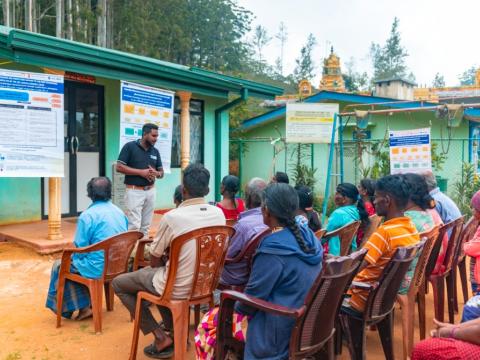Nearly 5,000 households supported as ECHO-funded crisis response project, successfully concludes in Sri Lanka

The Immediate Lifesaving and Protection Support to the Most Vulnerable Affected by the Sri Lankan Economic Crisis Project - otherwise known Sri Lanka Economic Crisis Response Project concluded recently, after enabling 4,724 identified vulnerable households to meet their immediate life-saving and protection needs through cash assistance.
Funded by the European Union Civil Protection and Humanitarian Aid (ECHO), the project was implemented by World Vision Lanka working in consortia with ACTED and Save the Children, in Vavuniya and Kilinochchi (Northern Province), Nuwara Eliya and Badulla (Central Province) and Colombo and Gampaha (Western Province) districts.
With a strong commitment to serve for the well-being of families, especially children, the project renewed the sense of hope and self-reliance among the affected communities. This is exemplified through remarkable outcome of the project, where the percentage of households with an acceptable Food Consumption Score (FCS) witnessed a positive increase, rising from 78% in March to 79% in May, indicative improved of food security.
The multipurpose cash assistance was more powerful during its third and final installment, where it played a prominent role in empowering communities to establish sustainable livelihoods that are capable of providing for their families regularly. Determined households strategically invested the funds in various livelihood ventures such as home gardening, poultry farming, fisheries, starting small grocery shops, and processing and grinding mills.
In alignment with the provision of multi-purpose cash assistance, the project methodically enhanced the local capacities in managing protection risks. Specifically identifying and assisting 1,304 high-risk households, the project established a well-structured network encircling local authorities, women groups, community-based organizations and child representatives. This collective approach guarantees seamless access to safeguarding mechanisms for vulnerable individuals, empowering them to voice their concerns and seek immediate support.
It is remarkable that through all its interventions the project has so far impacted more than 7,000 children.
Furthermore, the knowledge dissemination process of the project proved to be a catalyst for change. Facilitated by the project, 80 government officials have completed Training of Trainers (ToT) sessions on protection and in return they supported the consortium in conducting 193 series of community awareness programmes. These sessions favored the community members to get equipped with essential information, enhancing their know-how on available social networks and services. Today, these enabled communities are building resilience and developing sustainable strategies for coping with the crisis.